The Fighting Seabees Blu-ray Movie
HomeThe Fighting Seabees Blu-ray Movie 
Olive Films | 1944 | 100 min | Not rated | Apr 23, 2013
Movie rating
6.8 | / 10 |
Blu-ray rating
| Users | 0.0 | |
| Reviewer | 3.5 | |
| Overall | 3.5 |
Overview
The Fighting Seabees (1944)
Wedge Donovan is the civilian head of a construction company approached by the Navy to train their men as specialists. Instead, the impetuous Donovan wants to prove his crew are up to the job, but they are shot up by the Japanese.
Starring: John Wayne, Susan Hayward, Dennis O'Keefe, William Frawley, Leonid KinskeyDirector: Edward Ludwig
| War | Uncertain |
| Romance | Uncertain |
| Drama | Uncertain |
Specifications
Video
Video codec: MPEG-4 AVC
Video resolution: 1080p
Aspect ratio: 1.37:1
Original aspect ratio: 1.37:1
Audio
English: DTS-HD Master Audio Mono
Subtitles
None
Discs
25GB Blu-ray Disc
Single disc (1 BD)
Playback
Region A (locked)
Review
Rating summary
| Movie | 3.0 | |
| Video | 3.5 | |
| Audio | 4.0 | |
| Extras | 0.0 | |
| Overall | 3.5 |
The Fighting Seabees Blu-ray Movie Review
Reviewed by Jeffrey Kauffman April 24, 2013Would you have had the guts to have called The Duke a “chicken hawk”? Most sensible people would probably instantly answer “no”, but there are recurrent legends that actual servicemen took John Wayne to task during the filming of The Fighting Seabees that the only “fighting” Wayne was seeing was courtesy of the rah-rah war films he was making. The ranks of Hollywood leading men soon became actual ranks during the war years, with a lot of major stars enlisting in “the cause”, with many of them going on to establish laudable military careers. But Wayne continued to receive deferments through the war, something which evidently created some fiction not just with Wayne’s fan base but also within the actor himself. Perhaps that’s one reason why he associated himself with films of such hyperbolic jingoistic fervor like The Fighting Seabees, a factually ludicrous account of the founding of the so-called Construction Battalions (CB or Seabee for short) which started out as the building forces for the armed services but which ultimately graduated into quasi-fighting units themselves. The Fighting Seabees proved to be one of Wayne’s most popular features when it was released in 1944, and while it may strike some modern viewers as hopelessly corny and even problematic, when placed within the context of its time, it’s not hard to understand why it was met with such acclaim. In the early days of 1944 the end of the war seemed a far distant horizon. Few if any knew about the nascent plans of Operation Overlord and while Hitler’s forces were beginning to get significant pushback from the Russians especially, the Pacific theater (despite Midway) was still anyone’s game.
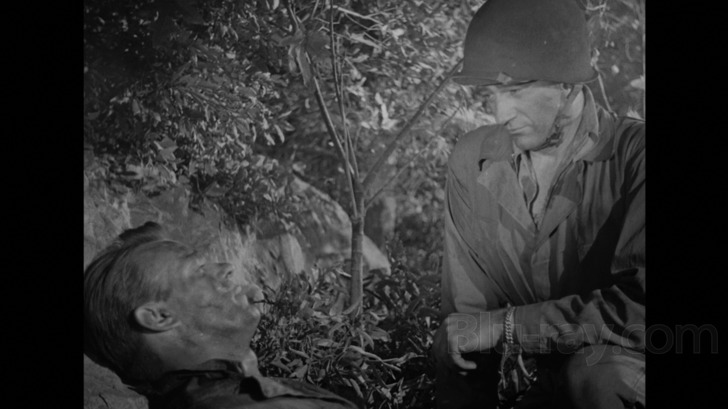
A number of recent Olive Films releases have featured characters with shall we say unusual names and The Fighting Seabees continues in that questionable tradition with stalwart hero Wedge Donovan (John Wayne), leader of a construction company whose men have just been decimated in a Japanese attack on an island they were sent to in order to build an airstrip. This is one of the few elements of the film which actually has at least one foot in reality, as these civilians were prevented from carrying arms and often were in fact sitting ducks for attacks by the enemy. Wedge (one shudders to think what his childhood nickname might have been) is none to pleased to greet his men getting back from their mission only to find out several won’t be coming back, as well as to see several others are badly injured. He finds the Navy man responsible for keeping his men from taking up arms, and finds perhaps a bit to his surprise that Lt. Commander Bob Yarrow (Dennis O’Keefe) is as upset over the issue as he is, asking Wedge to join him in lobbying the Washington powers that be to arm the construction crews. Meanwhile, a woman with whom Wedge has already “met cute” at the dockside while waiting for his guys to disembark turns out to be Yarrow’s reporter girlfriend Connie Chesley (Susan Hayward).
The Fighting Seabees then plays out in a series of episodes. The first sees Wedge storming out of a meeting with the Washington, D.C. commander who wants Wedge’s guys to undergo actual battle training before they’re armed, with Wedge saying he’s going to their current island building site to make sure if the Japs (as they’re called in this film, when they’re not being called worse names) do attack, Wedge’s guys are ready to fight back. On the boat to the island, Wedge is surprised to find Connie, and even more surprised to hear that Bob is on his way to the island himself to make sure that Wedge doesn’t get himself into trouble. Trouble of course ensues, first romantically, when Wedge impulsively kisses Connie before remembering that Connie “is Bob Yarrow’s girl”, and then, later, when Wedge does arm his guys, thereby spoiling a trap that Bob had set up for the encroaching Japanese. A rout of the construction men results, with Wedge obviously shocked that his good intentions have led to the deaths of many of his men. In one of the film's more ludicrous moments, Connie suddenly appears out of nowhere after the main battle has ended, only to be shot by a barely surviving Japanese sniper (guess whether or not she survives).
Wedge, somewhat chastened, returns to Washington, D.C. with Bob, where Wedge finds out he’s been commissioned a Lt. Commander himself and that a training regimen will be undertaken. This time Wedge doesn’t argue and we get a requisite montage showing hundreds of guys with construction backgrounds being signed up to the newly named Seabees (the scene of the Washington commander “coming up” with the name is rather funny if you have a suitably skewed sense of humor). Then with his newly trained battalion in tow, Wedge (along with Bob, of course) goes to yet another island where the final act of the film plays out, with some patently outlandish battle sequences that were obviously meant to rouse a domestic wartime audience.
The Fighting Seabees is undeniably silly at times, but it’s also kind of interesting for at least a couple of (perhaps unintentional) reasons. The love triangle between Wedge, Connie and Bob has some interesting elements, with Connie basically ping ponging between the two characters for the entire film (Hayward got a lot of kissing practice in on this shoot). Connie has a fascinating little speech at the very tail end of the movie about how she could split her affections so easily, and it’s a rather telling one, given the historical context of the film. The other reason, which won’t be overtly spoiled here, has to do with Wedge’s fate. Olive Films seems to be on a mini-tear of sorts releasing Wayne vehicles that have one kind of interesting common thread among them (the other recent one in this category is Wake of the Red Witch).
The film may strike some as shockingly racist at times (the Japanese are basically referred to not just with a series of pejoratives but also dismissively as being less than human), but of course that was part and parcel of the American war propaganda effort as put forth by Hollywood. Within six months of The Fighting Seabees’s release, the Allies had stormed the beaches of Normandy and the Pacific theater was rapidly becoming a rout as well. Films like this made sure the peanut gallery kept cheering while the real fighters did the dirty work.
The Fighting Seabees Blu-ray Movie, Video Quality 
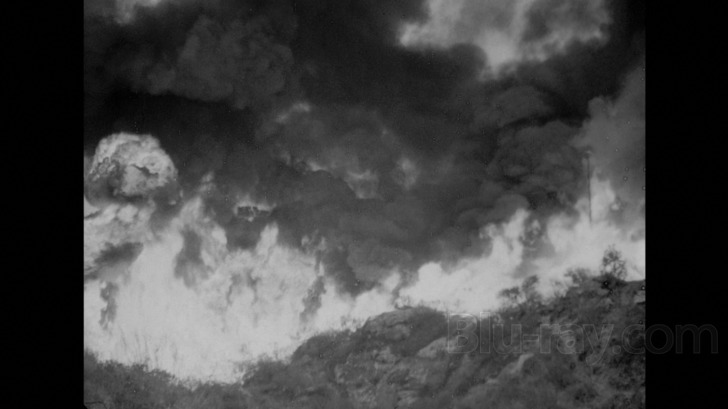
The Fighting Seabees is presented on Blu-ray courtesy of Olive Films with an AVC encoded 1080p transfer in 1.37:1. This is yet another generally solid looking Republic catalog release from Olive, though in this case there's quite a bit of stock footage that is noticeably more ragged, including lots of evident damage as well as less fulsome contrast than the bulk of the picture offers. The elements for the non-stock footage are in very good shape overall, with only very minor damage to report. Contrast is also generally strong, though once again has moments of relative milkiness along the way. Fine detail is acceptable if not overwhelming.
The Fighting Seabees Blu-ray Movie, Audio Quality 
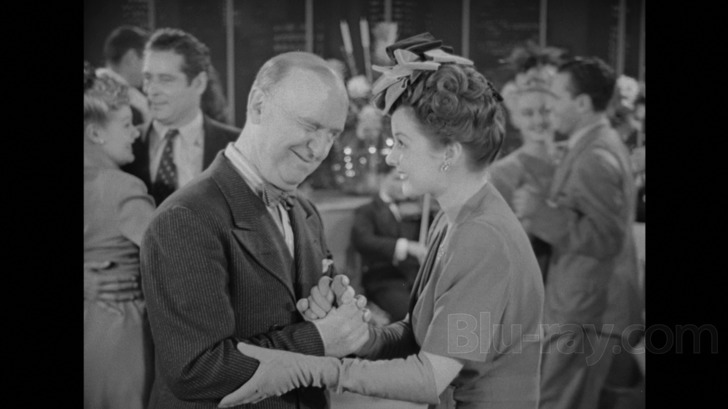
The Fighting Seabees' lossless DTS-HD Master Audio Mono mix sounds surprisingly spry for its age, with a decently full midrange and very little clipping in the higher registers. Walter Scharf's Oscar nominated score, which is rife with blaring brass cues, sounds great. (Scharf is one of the unsung—no pun intended—masters of the Golden Era of Hollywood, one who continued working, racking up several Academy Award nominations, for decades. In fact, one of Scharf's later film projects, adapting the Jule Styne-Bob Merrill score for the film version of Funny Girl, is about to debut on Blu-ray. Scharf also adapted the charming Anthony Newley-Leslie Bricusse score for Willy Wonka & the Chocolate Factory. Both of these films added to Scharf's Oscar nomination count.) Dialogue is cleanly presented and there's very little in the way of noticeable damage to report here.
The Fighting Seabees Blu-ray Movie, Special Features and Extras 
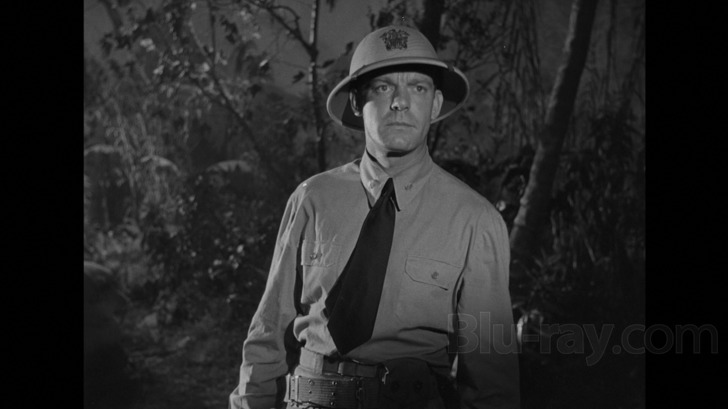
No supplements are offered on this Blu-ray disc.
The Fighting Seabees Blu-ray Movie, Overall Score and Recommendation 
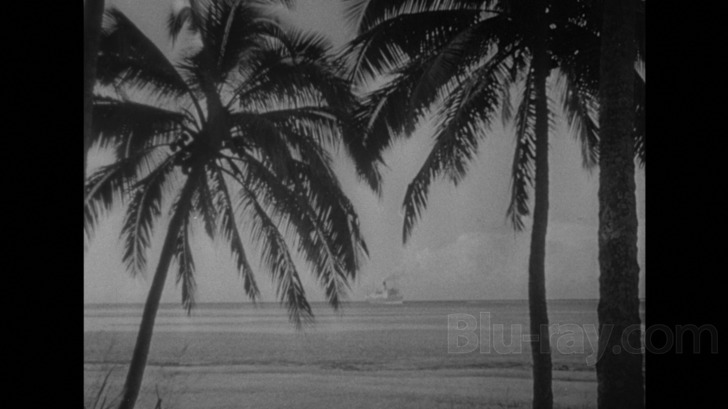
My late father was one of the so-called Greatest Generation, and in fact the battalion he commanded helped take Utah Beach on D-Day and went on to liberate most of the northwestern French peninsula, a campaign for which they were awarded the Silver Star. The French magazine Militaria did a big two part article on my father last year and I'm thrilled that this summer I'm taking my own sons to revisit my father's route in Normandy courtesy of a tour put together by the author of the article. For perhaps personal reasons, then, I tend to react with a certain lack of enthusiasm toward films that over fictionalize true historic events with regard to World War II. The Fighting Seabees was no doubt an exciting film in 1944, but it appears awfully dated and even downright silly to modern eyes, especially since it spends so much time setting up various conditions before the big battle finally unspools in the last act of the film. That said, Wayne, O'Keefe and Hayward (as well as a large supporting cast that includes William Frawley and Paul Fix) are excellent. Wayne fans will certainly want to check this film out one way or the other. This Blu-ray offers very good video and audio and with caveats noted comes Recommended.
Similar titles
Similar titles you might also like

Sands of Iwo Jima
4K Restoration
1949

Never So Few
1959

They Were Expendable
Warner Archive Collection
1945

Flying Tigers
1942

Battle Cry
Warner Archive Collection
1955

The Dirty Dozen
1967

The Caine Mutiny
1954

Twelve O'Clock High
1949

The Bridges at Toko-Ri
1954

The Boys in Company C
1978

The Red Ball Express
1952

A Walk in the Sun
1945

The Young Lions
Limited Edition to 3000 - SOLD OUT
1958

Midway
1976

The Green Berets
1968

Too Late the Hero
1970

Retreat, Hell!
1952

Attack!
Fragile Fox
1956

Run Silent, Run Deep
Special Edition
1958

Tobruk
1967